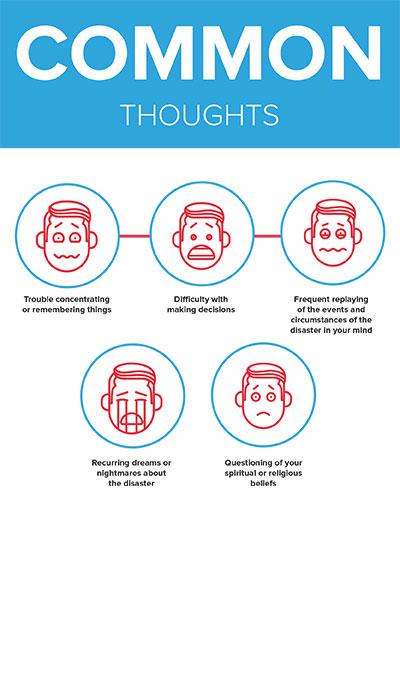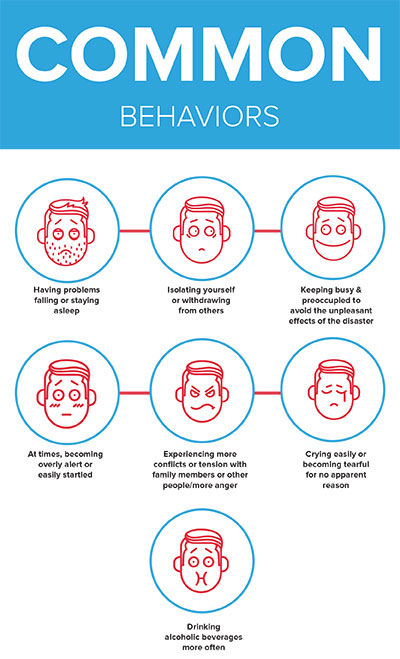Recovering from a Disaster


EMOTIONAL CARE FOR ADULTS
Disasters often strike with little or no warning. In an instant your home and community can be damaged or destroyed and forever changed. Even if your home or business does not suffer directly, no one who experiences a disaster is untouched by it.
For many, a disaster continues as a very real presence even long after it has passed. Feelings of sadness, depression, frustration, anger and anxiety are common. It is not unusual for these feelings to last for many months. Learning to recognize the normal reactions and emotions that occur can help you better understand these feelings and become more comfortable and effective in coping with them.
The following information explains the range of feelings and behaviors you can expect and how you, your family, friends and neighbors can best help yourselves and each other during this time of recovery. Suggestions for coping with the aftermath are offered throughout this handout.
Why do I feel the way I do?
The loss of or damage to your home, property and personal belongings has set into motion weeks and even months of effort to recover and rebuild. While physical property and possessions are initial concerns that consume your time and energy, emotional reactions to disasters are often pushed aside or ignored.
It is very common for people to experience a wide range of emotional reactions to a disaster. These reactions are experienced through thoughts, feelings, and actions and are often very upsetting to you and those around you.
What can I expect?
There are many concerns, adjustments and ordeals that follow the experience of a disaster. Generally, within a short time there is the reality of financial setbacks and the loss of property and personal possessions. The endless adjustments that you and your family must make will put additional stress on your relationships and daily living. You may also grow physically and mentally weary from the enormous task of cleaning up and rebuilding. All of these factors can hinder your ability to move forward.
In the aftermath of a disaster, it is important to remember that it will take time to heal and recover from the emotional effects of the event.
However, with the passing of time, your efforts to cope will begin to reduce the intensity and duration of these reactions and behaviors.
Coping mechanisms
There are many ways you can help yourself cope after a disaster:
- Talk to others about how you are feeling. It is important to talk about your experiences.
- Don’t overwork yourself. Take time for recreation, relaxation or a favorite hobby.
- Do not let yourself become isolated. Seek out and maintain connections with your community, friends, and relatives. Talk about your experiences with them.
- Pay close attention to your physical health. Maintain a good diet and make sure you are getting enough sleep. It is also helpful to be physically active or exercise.
- Do not use drugs and/or alcohol as a means to cope
Helping your family
- Families should keep some routines in place such as regular meals, certain enjoyable activities and other family rituals. This will help you feel as though life has some sense of order and normalcy.
- Couples should take time to be alone, as a couple, to talk about how you are feeling and to have fun together.
- Take time to talk with children about their experience. Listen to what they have to say and let them freely express their feelings. Moving back into the family home can bring mixed emotions such as relief and joy as well as sadness and fear. These are normal feelings and reactions.
- Your health—As you endure long-term stress, it is common for your health to be adversely affected.
If stress, anxiety, depression, or physical problems increase, persist, or interfere with your regular activities, you should consult a physician or a mental health professional.
Please reach out to the following resources in times of need:
- Disaster Distress Helpline: 800.985.5990
- National Suicide Prevention Lifeline: 800.273.8255
- Emotional Care for Children and Youth (English)
Emotional Care for Children and Youth (Spanish) - Emotional Care for Adults (English)
Emotional Care for Adults (Spanish) - Emotional Care for Older Adults (English)
Emotional Care for Older Adults (Spanish) - Provider Care Recommendations (English)
Provider Care Recommendations (Spanish)




